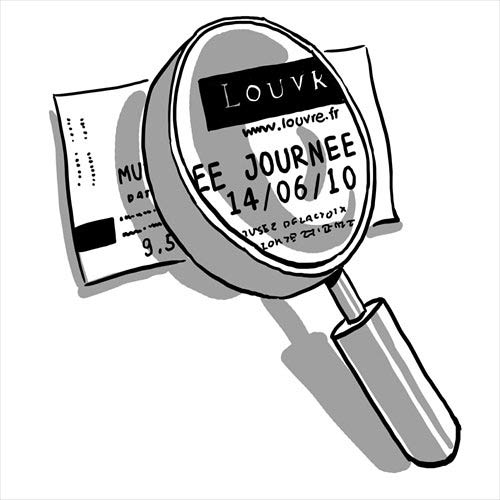 |
| (Illustration: Liu Rui/GT) |
The Louvre Museum, which is among the largest museums and most visited tourist attractions in the world, was hit last month by a fake ticket scandal for the first time ever. The tickets are widely believed to have been made in China.
Dozens of Chinese tourists were found to have been holding fake tickets last month. A package, which contained as many as 3,600 fake tickets for the museum, was seized by Belgian customs at the end of August. It turned out to have come from China and made Chinese tourists look like they were involved in criminal activity.
When this news hit the headlines, it prompted controversy regarding the "civility" of Chinese tourists.
A large number of netizens, many of whom were from China, strongly criticized Chinese tourists and their habits, as if the Chinese tourists who were found with the fake tickets were guilty of counterfeiting the tickets themselves.
However there is actually no direct evidence that these Chinese tourists were involved in counterfeiting tickets for the Louvre, in fact, these Chinese tourists were also victims.
They were foreign visitors, but at the same time, they were customers visiting the Louvre. It was reported that they had spent exactly the same amount of money as others but received neither real tickets nor respectful service. After the scandal broke, tourists from China were scrutinized heavily and criticized by others.
Ticket prices for the Louvre range from 12 euros ($16.03) to 16 euros. Actually, compared with the tour prices of trips from China to Europe which often cost around 20,000 yuan ($3,268.62), the ticket price for the Louvre is just a minor cost. It makes no sense to say that they would intentionally buy counterfeit tickets when so little money is at stake in the context of the entire trip.
Even if the fake tickets were actually made by a few unscrupulous merchants from China, it has nothing to do with the vast majority of Chinese tourists. However, these innocent people are the ones facing the controversy.
Most Chinese tourists visit Europe by joining tour groups, and they usually cannot tell whether their tickets distributed by the guides are authentic or not.
However, the reality is that as soon as this case broke, Chinese tourists were tarred with a "guilty" verdict, which ignores the fact that they have also suffered from this.
It's not necessary for us to get up in arms over the whole issue, but it is worth asking the reason why Chinese people are always the first to be blamed.
People from the West have long held a bias toward Chinese, but this is not the only reason.
China has attracted attention from the whole world in recent times, mainly because of its rapid economic growth. But regrettably, some Chinese people's standards of behavior have not kept pace with the rapid development. Some people are keen on using petty advantages and taking risks to make money, which makes China a market that is famous for fake products.
In regard to Chinese tourists, some have acted impolitely and left a bad image upon people from other countries. Also, most tourists' excessive dependence on their tour guides, coupled with a weak awareness of how to protect themselves, has made it possible for them to become innocent scapegoats.
Admittedly, these problems have already improved a lot in recent years, as the awareness of both the Chinese people and the government has been growing over this issue. However, restoring this image is much more difficult than damaging it. It requires an extended effort over the long term.
The good news is that with China becoming increasingly open to the outside world, more examples of courteous behavior by Chinese people can be seen around the world. Unscrupulous Chinese traders and tourists with a low level of morality are only individual cases.
Hopefully, sometime in the future, Chinese people will be associated with good deeds and being helpful, instead of issues like counterfeiting.
The author is a freelancer based in Shanghai.
 Pakistan suffers desperate shortage of water
Pakistan suffers desperate shortage of water Lanzhou MAC conducts actual-troop live-ammunition drill
Lanzhou MAC conducts actual-troop live-ammunition drill Heritage train ride across western Kosovo
Heritage train ride across western Kosovo Baby girl 'too young' for birthmarks treatment
Baby girl 'too young' for birthmarks treatment Beijing court hears airport blast case
Beijing court hears airport blast case Harbin named Chinese city with most beautiful women
Harbin named Chinese city with most beautiful women Wushu spirit
Wushu spirit Rugby girls
Rugby girls Funniest photos of sport stars as kids
Funniest photos of sport stars as kids  Residences of the royal house of Savoy
Residences of the royal house of Savoy China's frigate 'Bengbu'in fire training
China's frigate 'Bengbu'in fire training The last days of Wan Aihua
The last days of Wan Aihua Highlights at 12th National Games of China
Highlights at 12th National Games of China Beijing Film Academy welcomes freshmen
Beijing Film Academy welcomes freshmen 2013 Taiwan Int'l Tourism Expo kicks off in Taipei
2013 Taiwan Int'l Tourism Expo kicks off in TaipeiDay|Week|Month